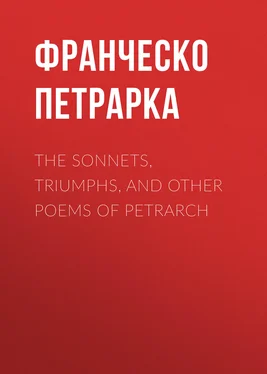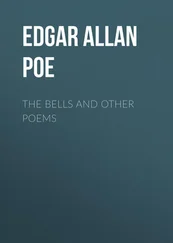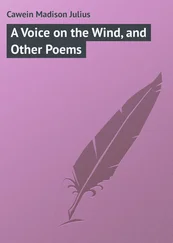Франческо Петрарка - The Sonnets, Triumphs, and Other Poems of Petrarch
Здесь есть возможность читать онлайн «Франческо Петрарка - The Sonnets, Triumphs, and Other Poems of Petrarch» — ознакомительный отрывок электронной книги совершенно бесплатно, а после прочтения отрывка купить полную версию. В некоторых случаях можно слушать аудио, скачать через торрент в формате fb2 и присутствует краткое содержание. Жанр: foreign_poetry, Поэзия, foreign_antique, foreign_prose, на английском языке. Описание произведения, (предисловие) а так же отзывы посетителей доступны на портале библиотеки ЛибКат.
- Название:The Sonnets, Triumphs, and Other Poems of Petrarch
- Автор:
- Жанр:
- Год:неизвестен
- ISBN:нет данных
- Рейтинг книги:5 / 5. Голосов: 1
-
Избранное:Добавить в избранное
- Отзывы:
-
Ваша оценка:
- 100
- 1
- 2
- 3
- 4
- 5
The Sonnets, Triumphs, and Other Poems of Petrarch: краткое содержание, описание и аннотация
Предлагаем к чтению аннотацию, описание, краткое содержание или предисловие (зависит от того, что написал сам автор книги «The Sonnets, Triumphs, and Other Poems of Petrarch»). Если вы не нашли необходимую информацию о книге — напишите в комментариях, мы постараемся отыскать её.
The Sonnets, Triumphs, and Other Poems of Petrarch — читать онлайн ознакомительный отрывок
Ниже представлен текст книги, разбитый по страницам. Система сохранения места последней прочитанной страницы, позволяет с удобством читать онлайн бесплатно книгу «The Sonnets, Triumphs, and Other Poems of Petrarch», без необходимости каждый раз заново искать на чём Вы остановились. Поставьте закладку, и сможете в любой момент перейти на страницу, на которой закончили чтение.
Интервал:
Закладка:
"I shudder to think of our prospects. If Venice and Genoa turn their victorious arms against each other, it is all over with us; we lose our glory and the command of the sea. In this calamity we shall have a consolation which we have ever had, namely, that if our enemies rejoice in our calamities, they cannot at least derive any glory from them.
"In great affairs I have always dreaded the counsels of the young. Youthful ignorance and inexperience have been the ruin of many empires. I, therefore, learn with pleasure that you have named a council of elders, to whom you have confided this affair. I expected no less than this from your wisdom, which is far beyond your years.
"The state of your republic distresses me. I know the difference that there is between the tumult of arms and the tranquillity of Parnassus. I know that the sounds of Apollo's lyre accord but ill with the trumpets of Mars; but if you have abandoned Parnassus, it has been only to fulfil the duties of a good citizen and of a vigilant chief. I am persuaded, at the same time, that in the midst of arms you think of peace; that you would regard it as a triumph for yourself, and the greatest blessing you could procure for your country. Did not Hannibal himself say that a sure peace was more valuable than a hoped-for victory! If truth has extorted this confession from the most warlike man that ever lived, is it not plain that a pacific man ought to prefer peace even to a certain victory? Who does not know that peace is the greatest of blessings, and that war is the source of all evils?
"Do not deceive yourself; you have to deal with a keen people who know not what it is to be conquered. Would it not be better to transfer the war to Damascus, to Susa, or to Memphis? Think besides, that those whom you are going to attack are your brothers. At Thebes, of old, two brothers fought to their mutual destruction. Must Italy renew, in our days, so atrocious a spectacle?
"Let us examine what may be the results of this war. Whether you are conqueror or are conquered, one of the eyes of Italy will necessarily be blinded, and the other much weakened; for it would be folly to flatter yourself with the hopes of conquering so strong an enemy without much effusion of blood.
"Brave men, powerful people! (I speak here to both of you) what is your object—to what do you aspire? What will be the end of your dissensions? It is not the blood of the Carthaginians or the Numantians that you are about to spill, but it is Italian blood; the blood of a people who would be the first to start up and offer to expend their blood, if any barbarous nation were to attempt a new irruption among us. In that event, their bodies would be the bucklers and ramparts of our common country; they would live, or they would die with us. Ought the pleasure of avenging a slight offence to carry more weight with you than the public good and your own safety? Let revenge be the delight of women. Is it not more glorious for men to forget an injury than to avenge it? to pardon an enemy than to destroy him?
"If my feeble voice could make itself heard among those grave men who compose your council, I am persuaded that you would not only not reject the peace which is offered to you, but go to meet and embrace it closely, so that it might not escape you. Consult your wise old men who love the republic; they will speak the same language to you that I do.
"You, my lord, who are at the head of the council, and who govern your republic, ought to recollect that the glory or the shame of these events will fall principally on you. Raise yourself above yourself; look into, examine everything with attention. Compare the success of the war with the evils which it brings in its train. Weigh in a balance the good effects and the evil, and you will say with Hannibal, that an hour is sufficient to destroy the work of many years.[Pg lxxxii]
"The renown of your country is more ancient than is generally believed. Several ages before the city of Venice was built, I find not only the name of the Venetians famous, but also that of one of their dukes. Would you submit to the caprices of fortune a glory acquired for so long a time, and at so great a cost? You will render a great service to your republic, if, preferring her safety to her glory, you give her incensed and insane populace prudent and useful counsels, instead of offering them brilliant and specious projects. The wise say that we cannot purchase a virtue more precious than what is bought at the expense of glory. If you adopt this axiom, your character will be handed down to posterity, like that of the Duke of the Venetians, to whom I have alluded. All the world will admire and love you.
"To conceal nothing from you, I confess that I have heard with grief of your league with the King of Arragon. What! shall Italians go and implore succour of barbarous kings to destroy Italians? You will say, perhaps, that your enemies have set you the example. My answer is, that they are equally culpable. According to report, Venice, in order to satiate her rage, calls to her aid tyrants of the west; whilst Genoa brings in those of the east. This is the source of our calamities. Carried away by the admiration of strange things, despising, I know not why, the good things which we find in our own climate, we sacrifice sound Italian faith to barbarian perfidy. Madmen that we are, we seek among venal souls that which we could find among our own brethren.
"Nature has given us for barriers the Alps and the two seas. Avarice, envy, and pride, have opened these natural defences to the Cimbri, the Huns, the Goths, the Gauls, and the Spaniards. How often have we recited the words of Virgil:—
"'Impius hæc tam culta novalia miles habebit,
Barbarus has segetes.'
"Athens and Lacedemon had between them a species of rivalship similar to yours: but their forces were not by any means so nearly balanced. Lacedemon had an advantage over Athens, which put it in the power of the former to destroy her rival, if she had wished it; but she replied, 'God forbid that I should pull out one of the eyes of Greece!' If this beautiful sentiment came from a people whom Plato reproaches with their avidity for conquest and dominion, what still softer reply ought we not to expect from the most modest of nations!
"Amidst the movements which agitate you, it is impossible for me to be tranquil. When I see one party cutting down trees to construct vessels, and others sharpening their swords and darts, I should think myself guilty if I did not seize my pen, which is my only weapon, to counsel peace. I am aware with what circumspection we ought to speak to our superiors; but the love of[Pg lxxxiii] our country has no superior. If it should carry me beyond bounds, it will serve as my excuse before you, and oblige you to pardon me.
"Throwing myself at the feet of the chiefs of two nations who are going to war, I say to them, with tears in my eyes, 'Throw away your arms; give one another the embrace of peace! unite your hearts and your colours. By this means the ocean and the Euxine shall be open to you. Your ships will arrive in safety at Taprobane, at the Fortunate Isles, at Thule, and even at the poles. The kings and their people will meet you with respect; the Indian, the Englishman, the Æthiopian, will dread you. May peace reign among you, and may you have nothing to fear!' Adieu! greatest of dukes, and best of men!"
This letter produced no effect. Andrea Dandolo, in his answer to it, alleges the thousand and one affronts and outrages which Venice had suffered from Genoa. At the same time he pays a high compliment to the eloquence of Petrarch's epistle, and says that it is a production which could emanate only from a mind inspired by the divine Spirit.
During the spring of this year, 1351, Petrarch put his last finish to a canzone, on the subject still nearest to his heart, the death of his Laura, and to a sonnet on the same subject. In April, his attention was recalled from visionary things by the arrival of Boccaccio, who was sent by the republic of Florence to announce to him the recall of his family to their native land, and the restoration of his family fortune, as well as to invite him to the home of his ancestors, in the name of the Florentine republic. The invitation was conveyed in a long and flattering letter; but it appeared, from the very contents of this epistle, that the Florentines wished our poet's acceptance of their offer to be as advantageous to themselves as to him. They were establishing a University, and they wished to put Petrarch at the head of it. Petrarch replied in a letter apparently full of gratitude and satisfaction, but in which he by no means pledged himself to be the gymnasiarch of their new college; and, agreeably to his original intention, he set out from Padua on the 3rd of May, 1351, for Provence.
Читать дальшеИнтервал:
Закладка:
Похожие книги на «The Sonnets, Triumphs, and Other Poems of Petrarch»
Представляем Вашему вниманию похожие книги на «The Sonnets, Triumphs, and Other Poems of Petrarch» списком для выбора. Мы отобрали схожую по названию и смыслу литературу в надежде предоставить читателям больше вариантов отыскать новые, интересные, ещё непрочитанные произведения.
Обсуждение, отзывы о книге «The Sonnets, Triumphs, and Other Poems of Petrarch» и просто собственные мнения читателей. Оставьте ваши комментарии, напишите, что Вы думаете о произведении, его смысле или главных героях. Укажите что конкретно понравилось, а что нет, и почему Вы так считаете.












